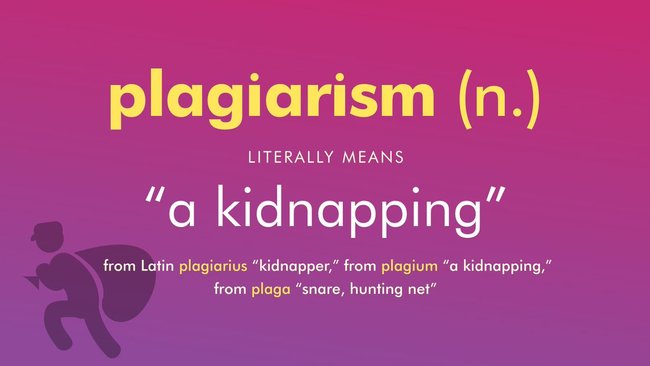
Plagĭum
In today’s culture, all the words and ideas are considered intellectual or private property such as homes, cars, or any other possession. Each idea belongs to its author as well as the right to be recognized for it.
The word plagiarism derives from the Latin plagĭum, which means ‘kidnapping’. The connotation that takes this word in our culture is like a kind of “kidnapping of ideas.” Plagiarism is defined by the dictionary of the Royal Spanish Academy as «copiar en lo sustancial obras ajenas, dándolas como propias» (DRAE, 2001) and, from a legal point of view, it’s seen as an infringement of copyright.
It is very easy to plagiarize because the current education system does not teach students to support the information used nor requires them to cite sources. It may be the case when making a summary in which plagiarism would be incurred without knowing, as well as while paraphrasing something could be asserted contrary to the stated by the author.
Plagiarism can be total or partial. One of the first ways to avoid plagiarism is to quote, regardless of whether the quote is textual or not. Usually, it’s quoted using the rules of the American Psychological Association (APA), although there are many other similar systems. You can also use the technique of paraphrasing, but only when it’s able to be expressed in a way personal way the original information.
Plagiarism ranges from the ideas, opinions, or theories of a person to any type of data-maybe a statistic, a graph or image- as long they are not of public knowledge. A data is of public knowledge when it can be found in different places and is known for a lot of people therefore it doesn’t need to be documented. An example of this would be the chemical formula for water H2O.
What is wrong with plagiarism? At the time of plagiarizing the communication skills are limited in order to express an individual’s own ideas, that is, in a way they refrain themselves from thinking on their own. Plagiarism is the act of appropriating anything of others. And isn’t that stealing?
The Internet has been and remains one of the main factors influencing the substantial changes that have been lived recently in the ways of communicating, it affects from the person to the social. Network connections allow the passage of knowledge quickly, efficiently, and globalized by allowing a greater number of people the possibility of having access to more information.
However, this rapid acceleration in the way of sharing data has created a dependency on the part of society towards networks that is sometimes at the expense of personal, labor and intellectual individuals’ activities, also it influences negatively on studies because now students only read the main ideas of an assignment without delving more into what they read or review. A conformist and less critical mindset to the information acquired is thus created.
It is necessary to promote ethics in the use of information, primarily on a personal level and then at the social level, in order to achieve development and real progress in the ways of thinking and the foundations that support scientific and social knowledge at the time present and the future. We must attribute the ideas or phrases, or any information that is not our own to their authors, that will be a pillar to build a better society.
References
Real Academia Española. (2001). Plagiar. At Diccionario de la lengua española (22.a ed.). Recovered from lema.rae.es
May 20th, 2016